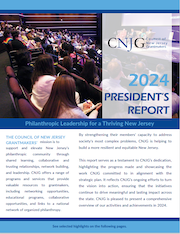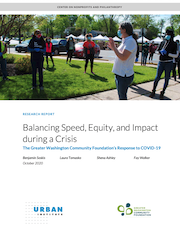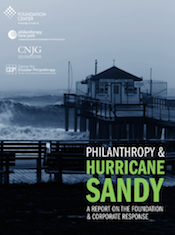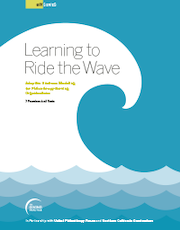Site Search
- resource provided by the Forum Network Knowledgebase.
Search Tip: Search with " " to find exact matches.
This paper explores community democracy as a cultural choice and a potential organizing system for philanthropy using stories that demonstrate its principles and practices, primarily growing from the experience of northern California communities. This experience offers a framework of principles and a beginning set of conclusions about how philanthropy can develop productive partnerships from the perspective of a place-based, community democracy.
The Ford Institute for Community Building, a program of The Ford Family Foundation, works to help community leaders learn how to implement local solutions based on principles of effective community building. This paper describes the development and work of the The Ford Institute for Community Building.

CNJG's President's Reports
This weekly conference call series welcomed New Jersey-based grantmakers along with national funders and provided an opportunity for grantmakers to hear from a wide range of experts in the field of disaster philanthropy. This series started on November 5, 2012, one week after Sandy struck New Jersey, and continued through March 25, 2013. The written summaries of each recording are listed below.
This advocacy and civic engagement toolkit is designed for community and public foundations that want to educate and encourage their grantees about getting involved in civic and policy activities to increase organizational capacity and impact. While its primary focus is on the grantmaking activity of these foundations, the toolkit also addresses rules and guidance for policy involvement by foundation officials acting on behalf of their foundations.
From the Commonfund, these white papers on investment policy statements, spending policy, board governance and risk tolerance, together with their most recent studies of investments at private and community foundations, operating charities and nonprofit healthcare organizations are made available though CNJG's Investment Forum for Foundations and Endowments.
This weekly conference call series welcomed New Jersey-based grantmakers along with national funders and provided an opportunity for grantmakers to hear from a wide range of experts in the field of disaster philanthropy. Series 1 started on November 5, 2012, one week after Sandy struck New Jersey, and continued through March 25, 2013. Series 2 started on September 9, 2013 and concluded on November 4, 2013. The written compendium of the recordings is listed below.

The COVID-19 public health and economic crisis has changed our world as we know it. As employers moved to remote work, schools shifted to distance learning, and businesses closed completely, it became clear that the impact on residents, nonprofits, and businesses was far greater than anyone could have ever imagined.
In response to the growing and evolving needs of our region, the Greater Washington Community Foundation established the COVID-19 Emergency Response Fund to raise and rapidly deploy funding to local nonprofits providing food, shelter, educational supports, and other critical services.
From the beginning our goal was clear: to address the immediate needs and reach adversely affected communities, particularly low-income households and communities of color. We know all too well that in a crisis like this, these marginalized communities are hit the hardest, and often take the longest to recover.
In times of crises, The Community Foundation is our region’s philanthropic first responder, bringing together individuals and families, philanthropic peers, corporate partners, and local government advisors to address community issues. Building on our rich history of emergency response work, we grounded our COVID-19 response efforts in a similar coordinated approach.
This report chronicles the steps taken, under immense pressure, to develop a coordinated emergency response effort to support a broad range of needs across the region. Once again this effort has demonstrated that working in partnership and close collaboration with our philanthropic peers and local government advisors is an effective way to manage a response to both urgent and longer-term needs.
This weekly conference call series welcomed New Jersey-based grantmakers along with national funders and provided an opportunity for grantmakers to hear from a wide range of experts in the field of disaster philanthropy. This series started on September 9, 2013 and concluded on November 4, 2013. The written summaries of each recording are listed below.
The Newark Philanthropic Liaison is a unique partnership between the Council of New Jersey Grantmakers and the City of Newark, supported by several foundations. Read more about the Liaison’s work In these reports. Due to several transitions, there were no written reports between 2015 and 2022.

This new report from CNJG and partners examines the response of foundations, corporations, and other institutional donors to the devastation wrought by Hurricane Sandy in October 2012. Numbering nearly 600, these funders have so far committed more than $380 million for relief, recovery and building efforts. The hard data and reflective observations in the report contribute to the growing body of knowledge that helps foundations and corporations be strategic and effective with their giving when disaster strikes.
Two years after the historic storm, Philanthropy & Hurricane Sandy: A Report on the Foundation & Corporate Response breaks down the allocation of dollars contributed thus far and offers perspective on the role of private giving in disaster response and lessons to be taken from this one. The report was published by the Foundation Center in partnership with the Council of New Jersey Grantmakers and Philanthropy New York, and with support from the Center for Disaster Philanthropy.
“Throughout the past two years, our exceptional nonprofit and funder community has taken on challenges they never imagined,” said Nina Stack, president of the Council of New Jersey Grantmakers. “These organizations continue to develop innovative solutions that other communities will learn from and build upon in future disasters.”
In addition to the report’s numerous funders, CNJG wishes to thank the PSEG Foundation for supporting this project.
Capacity building enables nonprofit leaders and organizations to develop the skills and resources they need to improve their work. Since each situation is unique and circumstances are always changing, effective capacity-building support is tailored to best suit the needs of grantees. This publication offers practical guidance and considerations to help grantmakers design an impactful approach.
This advocacy and civic engagement toolkit is designed for private foundations that want to educate and encourage their grantees about getting involved in civic and policy activities to increase organizational capacity and impact. While its primary focus is on the grantmaking activity of foundations, the toolkit also addresses rules and guidance for policy involvement by foundation officials acting on behalf of their foundations.

Developed in partnership with United Philanthropy Forum and Northern California Grantmakers, this guide shares seven practices and 12 tools for Philanthropy-Serving Organizations who seek effective ways to mobilize resources to sustain their organization’s work. The guide features perspectives from dozens of leaders of national and regional PSOs and examples from our work with these organizations. Much of the content is based on conversations and strategy work with PSO leaders, staff and board members.
Community foundations are beginning to deepen and shift how they work, adopting an anchor mission that seeks to fully deploy all resources to build community wealth. Moving into territory relatively uncharted for community foundations, they are taking up impact investing and economic development — some in advanced ways, others with small steps. This report offers an overview of how 30 representative community foundations — including The Seattle Foundation, the Vermont Community Foundation, and the Greater Cincinnati Foundation — are working toward adopting this new anchor mission.
This Democracy Collaborative report was written by Marjorie Kelly, Senior Fellow and Director of Special Projects and Violeta Duncan, Community Development Associate.
Sample disaster preparedness and recovery plans for foundations.
